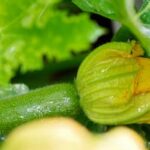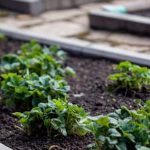Are you tired of battling stubborn weeds in your vegetable garden? Look no further than liquid weed killer for an effective solution.
This powerful tool is designed to help you maintain a healthy and thriving garden by eliminating unwanted plants that compete for nutrients and space.
In this article, we will explore the various types of liquid weed killers available, how to select the right one for your specific needs, safety precautions when using them, application techniques, managing weed growth after using the product, benefits of incorporating liquid weed killers into your gardening routine, and best practices for maintaining a weed-free vegetable garden.
When it comes to maintaining a bountiful vegetable garden, controlling weeds is essential. Weeds can hinder the growth of your plants by stealing vital resources like water, sunlight, and nutrients. Using a liquid weed killer can be an effective way to combat these pesky intruders and ensure that your vegetables have the best environment to flourish.
Before diving into the specifics of using liquid weed killers in your vegetable garden, it’s important to understand the different types available on the market. From pre-emergent to post-emergent options, each type is designed to target specific types of weeds and provide varying levels of control.
By understanding these differences, you can make an informed decision on which product is best suited for your unique gardening situation. So let’s get started on our journey to a healthier and more vibrant vegetable garden.
Understanding Different Types of Liquid Weed Killers
When it comes to maintaining a healthy and thriving vegetable garden, managing weed growth is essential. One of the most effective ways to control weeds in your garden is by using liquid weed killers. Understanding the different types of liquid weed killers available on the market can help you make an informed decision on which product to use for your vegetable garden.
There are several types of liquid weed killers that are commonly used in vegetable gardens, each with their own unique properties and methods of action. It’s important to familiarize yourself with these different types in order to choose the best option for your specific needs. Here are some common types of liquid weed killers:
- Selective herbicides: These liquid weed killers target specific types of weeds while leaving your vegetable plants unharmed. They are ideal for controlling broadleaf weeds, grasses, or sedges without affecting the vegetables in your garden.
- Non-selective herbicides: Unlike selective herbicides, non-selective herbicides will kill any plant they come into contact with, including your vegetables. These should be used with caution and only applied directly to the weeds you want to eliminate.
- Systemic herbicides: This type of liquid weed killer is absorbed by the plant and moves throughout its system, ultimately killing it from within. Systemic herbicides provide long-lasting effects and are effective against a wide range of weeds.
Before choosing a liquid weed killer for your vegetable garden, consider the type of weeds you are dealing with and the potential impact on your vegetables. Selecting the right type of liquid weed killer will ensure that you effectively manage weed growth without harming your valuable crops.
Selecting the Right Liquid Weed Killer for Your Vegetable Garden
When it comes to selecting the right liquid weed killer for your vegetable garden, it’s important to consider the specific needs and challenges of your garden. With a variety of options available, it can be overwhelming to determine which liquid weed killer is best suited for your vegetables. Here are some factors to consider when selecting a liquid weed killer for your vegetable garden.
Understanding Your Garden’s Needs
Before choosing a liquid weed killer, it’s important to assess the specific needs of your vegetable garden. Consider the types of weeds that commonly invade your garden, as well as any specific challenges such as sensitive plant varieties or soil composition. Understanding these factors will help you select a liquid weed killer that effectively targets the weeds while ensuring the safety of your vegetables.
Researching Different Formulas
There are various formulations of liquid weed killers available on the market, each with its unique set of ingredients and benefits. Some products may be designed specifically for broadleaf weeds, while others may target grassy weeds. Researching different formulas will help you narrow down the options and choose a product that aligns with your garden’s needs and preferences.
Consulting With Experts
If you’re unsure about which liquid weed killer is best for your vegetable garden, consider consulting with gardening experts or professionals at your local nursery. They can provide valuable insights and recommendations based on their experience and knowledge of different products. Additionally, they can offer guidance on application techniques and safety measures to ensure successful weed control without compromising the health of your vegetable plants.
By carefully considering these factors and seeking expert advice, you can select the right liquid weed killer for your vegetable garden that effectively manages weed growth while preserving the health and vitality of your vegetables.
Precautions and Safety Measures When Using Liquid Weed Killers
Using liquid weed killers in vegetable gardens can be an effective way to manage unwanted vegetation, but it is important to take proper precautions and safety measures when using these products. Here are some key steps to ensure the safe and responsible use of liquid weed killers in your vegetable garden.
Read and Follow the Instructions Carefully
Before using any liquid weed killer, it is crucial to carefully read and understand the instructions provided by the manufacturer. This includes information on how to properly dilute the product, application rates, and safety precautions. Following these instructions will help minimize any risks associated with using liquid weed killers.
Wear Protective Gear
When applying liquid weed killers in your vegetable garden, it is essential to wear protective gear such as gloves, long sleeves, long pants, closed-toe shoes, and eye protection. This will help prevent direct contact with the product and minimize skin or eye irritation.
Keep Children and Pets Away
Ensure that children and pets are kept away from the treated area while applying liquid weed killers in your vegetable garden. Once the product has been applied, it is important to restrict access to the treated area until it has completely dried.
By taking these precautions and safety measures when using liquid weed killers in your vegetable garden, you can effectively manage weeds while minimizing potential risks to yourself, your family, pets, and the environment.
Application Techniques for Liquid Weed Killers in Vegetable Gardens
When it comes to using liquid weed killers in your vegetable garden, proper application techniques are crucial for effectively controlling weed growth without harming your valuable plants. By following the right methods, you can ensure that the liquid weed killer targets the unwanted weeds while preserving the health of your vegetables.
Here are some important application techniques to keep in mind:
- Read and follow the product label: Before applying any liquid weed killer, carefully read the label for specific instructions on application rates, mixing ratios, and safety precautions. Different products may have varying guidelines, so it’s essential to adhere to the manufacturer’s recommendations.
- Timing is key: Apply the liquid weed killer when the weather is calm and dry, as windy conditions can cause drift and potentially harm your vegetable plants. Ideally, choose a day with no rain forecasted for at least 24 hours after application to allow the product to properly penetrate the weeds.
- Spot-treat problem areas: Use a targeted approach by applying the liquid weed killer directly onto the weeds rather than broadcasting it over an entire area. Spot-treating allows you to minimize contact with your vegetables and reduce the risk of unintentional damage.
In addition to these techniques, it’s important to consider using protective gear such as gloves, goggles, and a mask when handling liquid weed killers. Taking these precautions will help safeguard your health while applying these potent products in your vegetable garden.
By mastering these application techniques and safety measures, you can effectively harness the power of liquid weed killers to maintain a thriving vegetable garden free from invasive weeds. Remember that consistency is key when managing weed growth after using a liquid week killer for vegetable gardens – regular monitoring and spot treatments will help keep your garden in top condition.
Managing Weed Growth After Using Liquid Week Killer
Once you have applied a liquid weed killer to your vegetable garden, it is important to consider the management of weed growth in the aftermath. While the weed killer will have effectively targeted and eliminated existing weeds, it is essential to prevent new weed growth from taking over your garden. Here are some strategies for managing weed growth after using a liquid week killer for vegetable gardens.
First, consider using mulch as a natural way to suppress weed growth. Applying a layer of organic mulch such as straw, wood chips, or grass clippings can help smother any remaining weeds and prevent new ones from sprouting. Mulch also helps retain moisture in the soil and regulates soil temperature, creating a healthy environment for your vegetable plants while deterring weed growth.
Another effective approach is to regularly inspect your vegetable garden for any signs of new weed growth. By catching weeds early on, you can quickly remove them before they have the chance to spread and compete with your vegetables for nutrients and sunlight. This proactive approach will help maintain a weed-free environment in your garden.
Additionally, consider implementing companion planting techniques to naturally deter weed growth. Certain plants like marigolds, basil, and mint have properties that repel common garden pests and inhibit weed germination. By strategically interplanting these companion plants with your vegetables, you can create a harmonious ecosystem that minimizes the need for chemical intervention.
| Managing Weed Growth Strategies | Benefits |
|---|---|
| Use of organic mulch | Suppresses new weed growth |
| Regular inspection for weeds | Early intervention to prevent spread |
| Companion planting techniques | Natural deterrence of weed growth |
Benefits of Using Liquid Weed Killers in Vegetable Gardens
Liquid weed killer for vegetable gardens can offer numerous benefits to gardeners looking to maintain a healthy and thriving vegetable garden. One of the main advantages of using liquid weed killers is their effectiveness in targeting unwanted weed growth without harming the surrounding vegetable plants. This targeted approach helps prevent competition for nutrients, water, and sunlight, allowing your vegetables to grow unimpeded.
In addition to effectively controlling weed growth, liquid weed killers can also save time and effort compared to manual weeding methods. By simply applying the liquid herbicide to the affected areas, gardeners can efficiently manage weeds without the need for labor-intensive hand-pulling or hoeing. This can be especially beneficial for larger vegetable gardens where manual weeding may be impractical.
Using liquid weed killers in vegetable gardens can also contribute to a healthier overall garden environment by reducing the risk of pest infestations and disease. Weeds can often harbor pests and diseases that can spread to your vegetable crops, so controlling their growth with a liquid herbicide can help minimize these risks.
Additionally, a well-maintained and weed-free vegetable garden is not only visually appealing but also creates an ideal growing environment for your crops, promoting better yields and overall plant health.
| Advantages | Description |
|---|---|
| Effective Weed Control | Liquid weed killers target unwanted weeds without harming surrounding vegetable plants. |
| Time-Saving | Efficiently manages weeds without labor-intensive manual weeding methods. |
| Pest & Disease Prevention | Reduces the risk of pest infestations and diseases associated with weed growth. |
Best Practices for Maintaining a Weed-Free Vegetable Garden With Liquid Weed Killers
In conclusion, liquid weed killers can be an effective solution for maintaining a weed-free vegetable garden. By understanding the different types of liquid weed killers available and selecting the right one for your garden, you can effectively manage weed growth without harming your vegetables. It is important to take precautions and safety measures when using these products to ensure the health and safety of both your plants and yourself.
Additionally, once you have applied the liquid weed killer, it is crucial to properly manage any remaining weed growth. This can be done through regular monitoring and additional spot treatments as needed. By following application techniques and best practices, you can reap the benefits of a thriving vegetable garden free from pesky weeds.
Overall, utilizing liquid weed killers in your vegetable garden can save you time and effort in the long run. With proper maintenance and care, you can enjoy the satisfaction of a healthy, vibrant garden without the constant battle against unwanted weeds. Remember to always read and follow product instructions carefully to achieve optimal results while keeping your vegetable garden flourishing.
Frequently Asked Questions
What Weed Killer Is Safe to Use in a Vegetable Garden?
When it comes to using weed killers in a vegetable garden, it’s essential to opt for products that are labeled as safe for use around edible plants. Look for organic and natural herbicides that won’t harm your vegetables.
How Do I Kill Weeds in My Garden Without Killing Vegetables?
Killing weeds without harming your vegetables involves using methods like hand-pulling weeds, mulching the soil to smother weed growth, or using targeted applications of vinegar-based or organic herbicides on the weeds while avoiding contact with the vegetables.
How Do You Make Homemade Weed Killer That Won’t Kill Vegetable Plants?
Making homemade weed killer that won’t harm vegetable plants can be done by mixing ingredients like white vinegar, salt, and dish soap. This solution can be sprayed directly onto weeds while being careful not to overspray onto the vegetables themselves.

If you’re looking to get into vegetable gardening, or are just looking for some tips on how to make your current garden better, then you’ve come to the right place! My name is Ethel and I have been gardening for years. In this blog, I’m going to share with you some of my best tips on how to create a successful vegetable garden.





